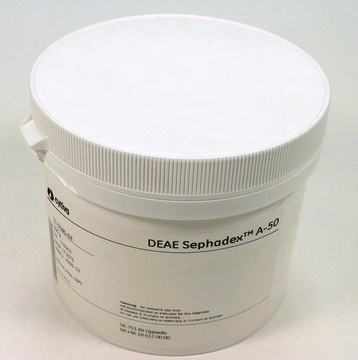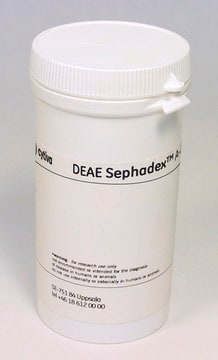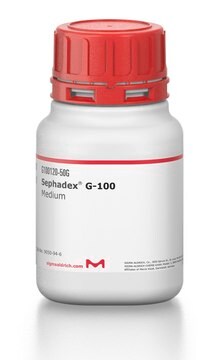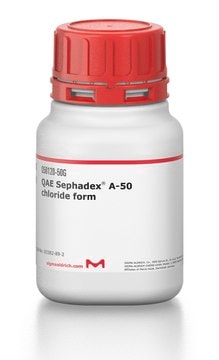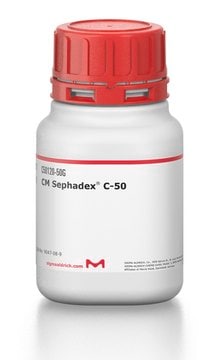A50120
DEAE–Sephadex®
Synonym(s):
Diethylaminoethyl Sephadex®
Sign Into View Organizational & Contract Pricing
All Photos(1)
About This Item
Recommended Products
form
powder
Quality Level
technique(s)
protein purification: suitable
matrix
cross-linked dextran
bead size
40-125 μm (dry)
pore size
~200,000 Da exclusion limit
pH
2—12
capacity
3-4 meq/g binding capacity
Related Categories
General description
A50120-100G′s updated product number is GE17-0180-01
A50120-500G′s updated product number is GE17-0180-02
A50120-500G′s updated product number is GE17-0180-02
Application
DEAE Sephadex can be used in ion exchange chromatography for purifying and isolating proteins. In has been used to identify and label an insulin activated nitric oxide synthase inhibitor (protein) in acute myocardial infarction (AMI) patients.
Legal Information
Sephadex is a registered trademark of Cytiva
replaced by
Storage Class Code
11 - Combustible Solids
WGK
WGK 3
Flash Point(F)
Not applicable
Flash Point(C)
Not applicable
Personal Protective Equipment
dust mask type N95 (US), Eyeshields, Gloves
Certificates of Analysis (COA)
Search for Certificates of Analysis (COA) by entering the products Lot/Batch Number. Lot and Batch Numbers can be found on a product’s label following the words ‘Lot’ or ‘Batch’.
Already Own This Product?
Find documentation for the products that you have recently purchased in the Document Library.
Customers Also Viewed
J P Rapp et al.
Hypertension (Dallas, Tex. : 1979), 6(4), 519-525 (1984-07-01)
Dahl salt-sensitive (S) rats which are susceptible to hypertension have lower urinary kallikrein excretion than salt-resistant (R) rats which are not susceptible. Some physicochemical characteristics of partially purified urinary kallikrein were compared between the S and R strains. The isoelectric
R Hao et al.
The Journal of biological chemistry, 266(8), 5135-5139 (1991-03-15)
L-Glutamate decarboxylase, an enzyme under the control of the asexual developmental cycle of Neurospora crassa, was purified to homogeneity from conidia. The purification procedure included ammonium sulfate fractionation and DEAE-Sephadex and cellulose phosphate column chromatography. The final preparation gave a
T A Bektemirov et al.
Voprosy virusologii, (5)(5), 615-618 (1980-09-01)
The time course of RK-13 cell growth on a microcarrier DEAE-sephadex A-50 treated by different methods was studied. Treatment of the microcarrier according to the modified method was shown to provide the best conditions for cell attachment and growth. Herpes
L C Teh et al.
Vox sanguinis, 67(1), 8-13 (1994-01-01)
An ion exchange medium, DEAE-Fractogel 650M, can be used to capture factor VIII (FVIII) directly from plasma. Previous reports have focussed on the use of this medium to capture FVIII from cryoprecipitate. In this report, citrate phosphate dextrose plasma was
Effect of heme orientation on the reduction potential of cytochrome b5.
F A Walker et al.
Journal of the American Chemical Society, 110(18), 6234-6240 (1988-08-01)
Our team of scientists has experience in all areas of research including Life Science, Material Science, Chemical Synthesis, Chromatography, Analytical and many others.
Contact Technical Service

